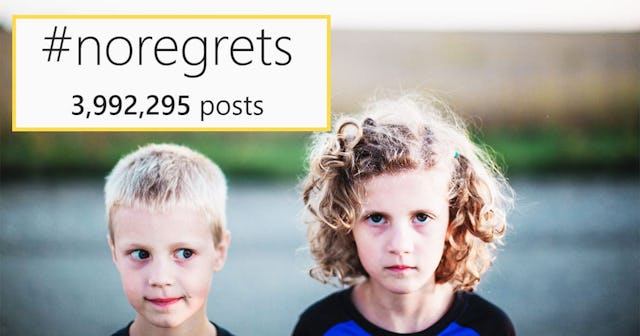Why #NoRegrets Is B.S. And What I'm Teaching My Kids Instead

My husband and I turned 40 this year. Our milestone birthdays got us talking about successes and failures – the things we regret. A few moments from our childhoods rose to the surface in the “wish we’d done it differently” category. After ten years of lessons, I stopped short of completing a rigorous piano program; he didn’t earn the rank of Eagle Scout. We can name myriad other regrets big and small, but those two stood out as times we stopped doing something because it was hard. And, we got to thinking, maybe that made it easier to quit the next time.
These regrets remind me of the positive power of regret: how claiming it teaches us something about ourselves and makes us relatable to others. Social scientist and resilience expert Dr. Brené Brown puts it this way: “Regret is a fair but tough teacher.”
How then can we explain the popularity of “no regrets” and its 3.9 million posts on Instagram (#noregrets)? Mistakes are inevitable. Not regretting them doesn’t mean I didn’t make them – it only makes me more likely to make them again.
I get going that route. Admitting regret is followed by feelings of failure, foolishness, and shame. My pride takes a hit. “No regrets” conveys an air of confidence – a claim that any choice is the right one. It gets me off the hook. Or does it?
As a communications professional, I understand the power of words. They represent real ideas and carry real meaning. I think that’s why “no regrets” bothers me so much. It’s the axiomatic “nothing to see here.” But if regret is real and regret is right, then as parents it is our job to help our kids recognize it and respond appropriately. Here are three steps we can take to teach our kids how best to manage regret:
1. Admitting you have regrets earns respect.
Why? Because we all have them. Ask your kids to think of friends, professional athletes or public figures, or adult superiors in their life who are quick to make excuses for their behavior or brush a mistake under the rug. Do they trust or admire them? Of course not. If I name my poor choices for what they are, I’m showing my children it is honorable to own failure in the same way I own success.
2. Know the difference between a lesson learned and a regret.
I want our children to be ambitious, to try new things and stretch themselves. At times, they’re going to fail. When they do, I want them to ask themselves: did I bring my best to this? If so, they should substitute any pings of regret with pride, no matter the outcome. But if they discover the root of their failure was poor judgment (laziness and procrastination equaling bad test results; carelessness in a friendship that betrayed trust; or not appreciating something good they had when they had it), I want them to ask, “What should I have done differently?” and “How will I make a better choice the next time?”
3. How to move past it.
While we should encourage our kids to bring their regrets to us so that we can help them examine their mistakes, let’s do so without shaming them. Regret researcher Neal Roese finds that regret rates at the top of the list of negative emotions for younger people because it prompts them to do better. In his book If Only, he concludes: “Regret is good. Thinking about what might have been is a normal component of the brain’s attempt to make sense of the world, and of the human quest for betterment.” Let’s tell our kids: naming your regret is a good place to start, but you don’t have to stay there. If need be, ask for the forgiveness of others, then forgive yourself and move forward.
When regret gives way to discretion, we’re helping our kids develop into people who own their mistakes and move on from them with their integrity intact, and the wisdom to make better choices.
This article was originally published on